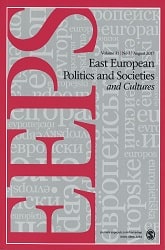Weasel Words and the Analysis of “Postcommunist” Politics: A Symposium
Weasel Words and the Analysis of “Postcommunist” Politics: A Symposium
Author(s): Michael H. Bernhard, Venelin I. Ganev, Anna Grzymała-Busse, Stephen E. Hanson, Yoshiko M. Herrera, Dmitrii Kofanov, Anton ShirikovSubject(s): Political Philosophy, Political history, Government/Political systems, Politics and communication, Post-Communist Transformation, Rhetoric
Published by: SAGE Publications Ltd
Keywords: Eurasia; postcommunism; socialism; populism; neoliberalism;
Summary/Abstract: A weasel word is a term used in academic or political discourse whose meaning is so imprecise or badly defined that it impedes the formulation of coherent thought on the subject to which it is applied, or leads to unsubstantiated conclusions. In this symposium we consider several key terms central to the study of postcommunist politics and discuss the extent to which they fall into this category. The terms discussed here include regime terminology, the notion of postcommunism, the geographic entity “Eurasia,” socialism, populism, and neoliberalism. While the authors come to different conclusions about the extent to which these terms are weasel words, they also provide pointers for how to deploy terms in ways that are consistent with the underlying concept and thus aid in the cumulation of knowledge about the region.
Journal: East European Politics and Societies
- Issue Year: 34/2020
- Issue No: 02
- Page Range: 283-325
- Page Count: 43
- Language: English
- Content File-PDF

